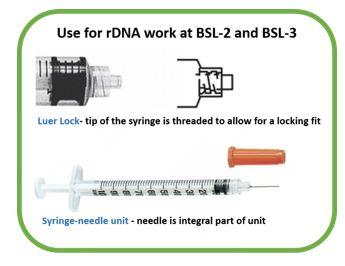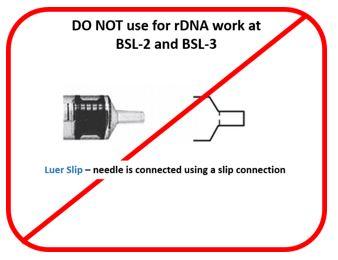Article published 11/2016
In accordance with the NIH Guidelines, when research is being conducted at BSL2 or BSL3 containment levels, “only needle-locking syringes or disposable syringe-needle units (i.e., needle is integral to the syringe) should be used for the injection or aspiration of fluids containing organisms that contain recombinant or synthetic nucleic acid molecules.” This is also a good practice for any needle use involving pathogenic organisms or hazardous chemicals. The Institutional Biosafety Committee (IBC) recommends minimizing the use of needles whenever possible.
Caution should be used when handling needles and syringes to avoid autoinoculation and the generation of aerosols during use and disposal. Following use, syringes should be promptly disposed in a sharps container; exposures from needlesticks have been reported when used syringes are collected on a benchtop for disposal following animal inoculations. Needles should not be bent, sheared, replaced in the needle sheath or guard, or removed from the syringe following use. Sharps containers must be disposed of as hazardous waste and properly treated prior to final disposal1.
A graphic is provided below to illustrate the types of needle/syringe units that may and may not be used for research involving recombinant or synthetic nucleic acids, when said research is being conducted at BSL2 or BSL3 containment levels.
Questions regarding requirements of the NIH Guidelines can be directed to the Aswathy Sreedharan, Associate Biosafety Officer (319-335-9547) or Haley Sinn, Biosafety Officer (319-335-9553).


1 Sharps waste from BSL2 and BSL3 labs is to be disposed of as biohazardous waste; however, when mixed with certain chemicals, the sharps container may need to be disposed of as chemical waste. For questions regarding waste classification and segregation, please contact Jim Pyrz, Environmental Safety Manager (319-335-4625).